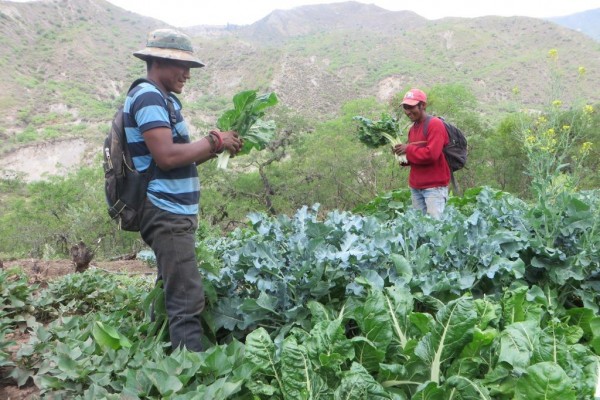
One of the actions that the Community of Saint Paul has developed as a result of the Covid-19 pandemic in the Andean communities of Bolivia has been the creation of family gardens and the distribution of seeds among peasant families to ensure food security and, therefore, fight against hunger in the region.
Currently, 106 families from four communities in the municipality of Independencia (Totorani, Rodeo, Tiquirpaya and Aramani) have implemented their orchard for self-consumption in the lower area of the mountain (at 6,500 feet over sea level), where the climate is warmer and more benign and allows the growth of a great diversity of vegetables. The inhabitants of this area, due to the climatic conditions and the orographic characteristics in which they live (between 9,500 and 10,200 feet above sea level), only cultivate potatoes, corn and wheat, ignoring the planting, care and growth of vegetables.
During these last six months, the Community of Saint Paul has supported them with seeds and technical advice for the implementation of sustainable agri-food systems. Each of the peasant families has managed with their effort, commitment and dedication to cultivate almost half a hectare with seeds of lettuce, beet, chard, tomato, zucchini, etc. ... Two months after having started their gardens, 537 people, among them the elderly and children are consuming the harvested products and enjoying their natural, tasty and ecological flavor. In addition, other families in the area, seeing the good production that their neighbors are having, are also now eager to have their own garden.
For several weeks, media around the world have reported extensively on the great fires that are ravaging the Amazon. The team of the Community of Saint Paul in Cochabamba tells us how this misfortune is particularly affecting Bolivia.
For two months now, several wildfires invade one of the greenest lungs in Bolivia. The news talk about more than two million hectares burned in the area of the Amazon, the Chiquitanía and the Bolivian Chaco. It is a environmental disaster for the fauna and the flora of the region, as well as a humanitarian crisis, for the indigenous people who inhabit those lands, who are losing everything.
Every year, at this time, “chaqueos”, or controlled burning, are carried out to prepare the land for planting or for raising cattle. Normally they do not get out of human control, but this year the Bolivian government has approved a controversial decree that promotes the extension of the agricultural frontier in forest areas allowing “controlled burning” and the settlement of new settlers from other areas of the country. This has caused the traditional burning to get out of control, causing, to a large degree, the present situation.
Several instances in the country, including the Bolivian Episcopal Conference, are crying out for the government to declare a national emergency in the affected areas, and to open up to the international help of experts to control the fires. In addition, to curb this environmental catastrophe, many voices also call for the immediate banning of the chaqueos as well as the uncontrolled installation of new farmers in the areas not suitable for agriculture. We hope that measures will be taken immediately and urgently to stop this tragedy, that is so badly affecting the country.
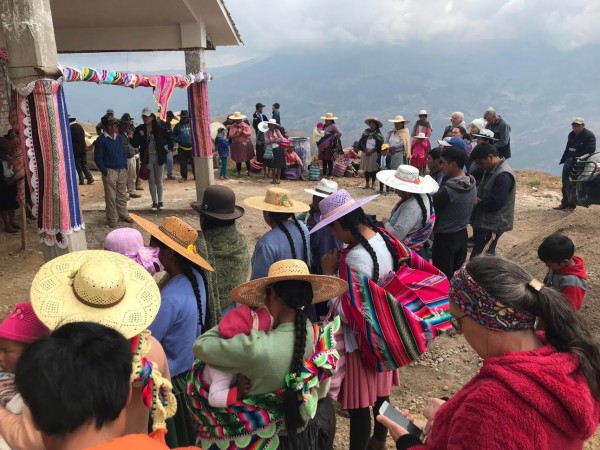
Last Saturday, August 24, took place in Totorani (Independence, Bolivia) the inauguration and blessing of a new chapel, which will also serve as a community center for the local population. The construction of this new space for prayer and community meetings was funded entirely by donations from parishioners of the Sacred Heart parish in Racine, Wisconsin, of which Ricardo Martín, a member of the Community of Saint Paul, is pastor.
The inauguration took place in a festive and celebratory atmosphere, with the presence of some fifty families from Totorani and several neighboring villages (Chulpani, Rodeo, Buenavista, Tiquirpaya). Father Teófilo, parish priest of Independence, and two other fellow priests (all of them Salesians) were also present, as were the members of the CSP living in Bolivia and Ricardo Martín, who traveled from the USA with several parishioners from Wisconsin.
The land where the new building stands is communal, and the people of the area donated it so that the community center and chapel could be built there. The construction is 23 meters long and 8 meters wide.
We congratulate all those involved in this initiative: the local communities who donated the land, the members of the CSP who coordinated the project and the parishioners of Sacred Heart in Racine who also made it possible with their generosity.
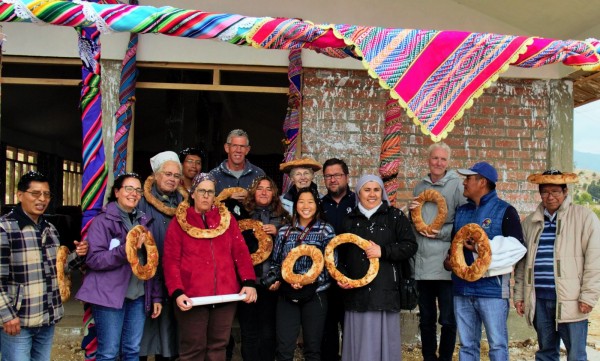
The Community of Saint Paul continues with its program of establishing latrines in Independencia, Bolivia
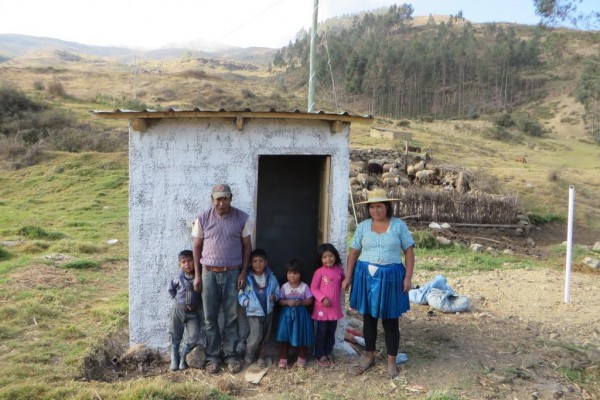
Ten months ago, we took on a new challenge in the rural area of Independencia (Cochabamba, Bolivia): the construction of simple but decent bathrooms for the families of the farming communities.
The farmers in this rural area live in houses built in a traditional way with adobe, wood and stone with thatched roofs. The residents of these communities do not have toilets or latrines, they go to the countryside to relieve themselves and have health problems, among others, due to the contamination of drinking water sources.
The bathrooms that we are starting to build are 2m x 1.5m, consist of a toilet, a shower and a tap outside the bathroom to catch the water and throw in the cup and to wash one’s hands. They are basic, but they allow families not to go outdoors to relieve themselves. We also saw the importance of the shower, since after doing interviews to the families going house by house we realized that they do not have a private space to wash and most of them bathe only once a month! We must bear in mind that we are at 3,500 meters above sea level, in a region of intense cold.
Currently 24 homes of the rural community of Totorani and 15 of Chulpani already have a decent bathroom to shower with hot water and to do their physiological needs with privacy and without polluting the environment.
Throughout the process of the implementation of the restrooms, the beneficiary families are actively participating, both in the choice of the technological option and materials, as well as in the conditions and commitments on their part. In addition, a hygiene and basic sanitation workshop has been developed with families to address issues such as health, individual and domestic hygiene, environmentally friendly practices, rational use of water and care and use of the bathroom. In this way, emphasis is placed on improving hygienic habits and ensuring the sustainability and proper use of bathrooms in homes.
The 39 families that already have their bathroom in their home are very happy and enthusiastically see the possibility that their children get sick less of diarrhea and are cleaner. They are aware that by using the bathrooms their environment improves, they have also gained in dignity and have shown that by organizing and working together everyone wins.
And we will continue with more bathrooms, because in total there are 105 families who want to have a bathroom in their home in this area.
Reforestation as an alternative to climate change in the province of Cochabamba (Bolivia)
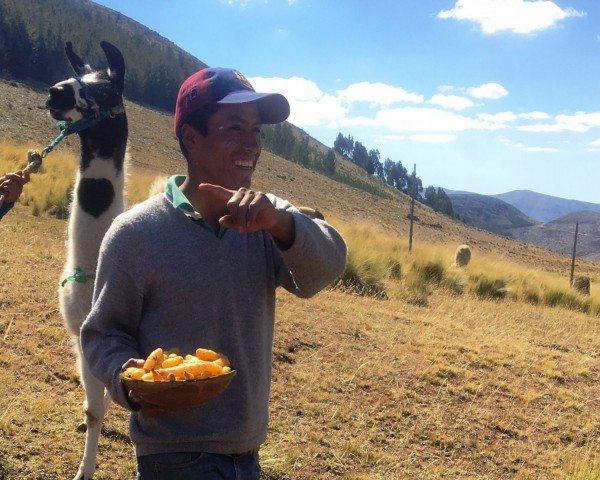
From the municipality of Vacas, in Bolivia, Aniceto Arroyo sends us the following testimony:
For 14 years, the Community of Saint Paul has been involved in different development projects in the highlands of this municipality of Vacas. One of them is the initiative of reforestation in ten rural communities. Climate change has reduced the harvest of Andean tubers typical of the area, producing a large migration of peasants to the cities, where they often become poorly paid labor.
The reforestation project in Vacas, through which one hundred hectares have been planted with more than 50,000 pine seedlings, is a long-term initiative that aims to provide wood for construction and for use in the home.
Community leaders have played a very important role in this process. Young David, for example, became involved in it since the time he was 12, and became one of its pillars. A few days ago, we were pleased to learn that the municipality of Vacas recognized the value of the project as an alternative for the future of their families. As a result, the municipality proposes to double production, including 120 families in its development. The proposal will be presented to the national government, which has resources for the environment from the European Union. In this context, the municipality has chosen young David as a technician to carry out the project during the next three years. They feel that an external person would not be involved in the same way as this young man from the community, who has a great experience of producing seedlings in the territory, 3,000 meters above sea level.
David, who has been the soul of this community work for ten years—despite not having finished high school—will be part of the positive change that continues to arrive in the area. The community is proud of its achievement and is confident that he will play a great role in carrying out the project. We hope that in a few years there will not be only one David, but many, helping the population of these areas achieve a dignified life.
A group from Milwaukee visits the CSP projects in Cochabamba, Bolivia
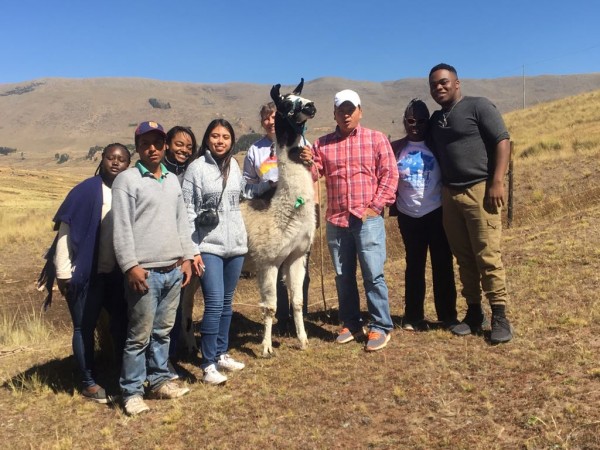
From May 22 to May 30, a group of people from various parishes in Milwaukee visited the projects that the Community of Saint Paul carries out in Cochabamba, Bolivia. The Director of the Missions Office in the Archdiocese of Milwaukee, Mrs. Antoinette Mensah, and Fr. Juan Manuel Camacho, of the CSP, coordinated the event.
The visitors were able to learn about the reality of the street children of Cochabamba and to listen to the stories of the children themselves. The program that the CSP has in Cochabamba (as it has been mentioned often in this blog) wants to prevent that children who live in the street may end up using drugs and being caught in the networks of drug distribution. From “Casa San José” (a shelter center for children) we seek to reunite children and adolescents with their families, carrying out a process of rapprochement and knowledge of each particular situation.
The group from the USA also could get a sense of how harsh and difficult it is the life of the peasants in the Andes, in the rural area of Cochabamba, located at 4,000 meters above sea level: these peasants face the rigors of nature by producing llamas, sheep, potatoes and beans, as well as pine trees to reforest their mountains. Outside the city of Cochabamba the CSP works for the integral human development of the indigenous communities of the municipality of Vacas and Independencia.
The purpose of the trip was to help its participants (mostly young people) to reflect on the missionary reality of the Church and on the different expressions of faith lived by the peoples among whom the Community of Saint Paul works. The aim was to deepen the connection of the local Church of Milwaukee with the universal reality of the Church. It was, without a doubt, a very fruitful trip.
Commemoration of the Anniversary of Casa San José in Bolivia
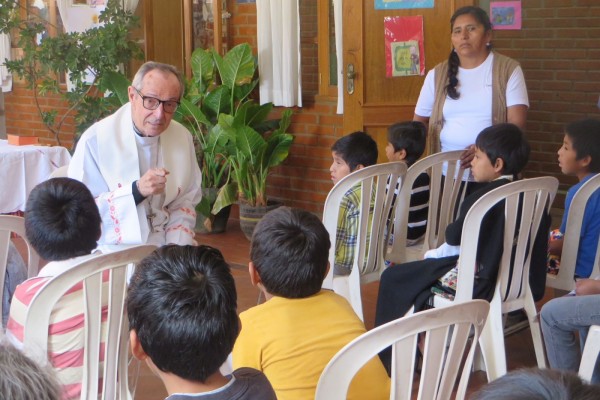
May 1, the feast of St. Joseph the Worker, is a very special day for Casa San José in Cochabamba, Bolivia: it marks our anniversary. Fourteen years ago, we opened our doors to shelter children and teenagers in vulnerable situations, especially those on the streets, so that they might live in a dignified manner. While the youth are living at Casa San José, we work with their relatives, so that reintegration of the children into their families can be successful and they will not return to the streets.
In Bolivia, there are close to 2,200 children and adolescents living in the street, more than 1,000 living in prison with their parents (who are completing penal sentences) and hundreds more who are victims of sexual violence, slavery and trafficking.
On May 1, to commemorate the 14th anniversary of the opening of Casa San José, Msgr. Tito Solari, Archbishop Emeritus of Cochabamba, joined us and celebrated the Eucharist with the 24 children and adolescents who are currently at Casa San José. It was a very beautiful, warm and joyful celebration. Bishop Solari repeated several times to the children that what God likes most about them is that the children are always smiling and happy. “Be smiling children, bearers of light, so that you may always illuminate the world. God holds you in his heart and he loves you very much,” he told them.
The Difficulties of Higher Education Faced by Rural Women in Bolivia
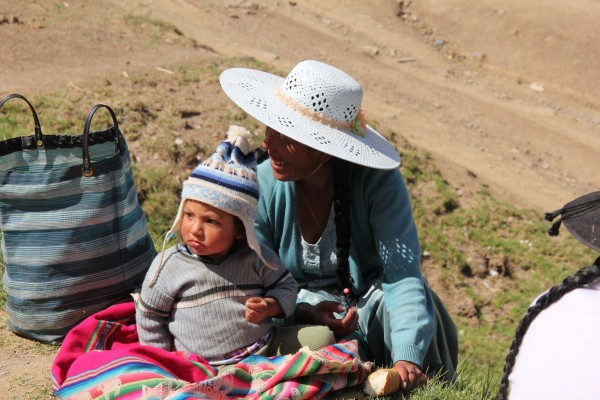
The scene repeats itself again and again: the father saying to his daughter, “Why do you need to continue studying if you already know how to read and write? That is enough to be a good wife. That's how it was for your mother, and you see her...proud of her five children.”
The daughter realizes that there is no real communication taking place. How can she convey to his dad the eagerness in her heart, this passion to continue her studies? If, after all, the friend who finished high school with her is already married and expecting a baby? Besides...studying agricultural science? A woman? Someone filled up your head with nonsense…
And so the story repeats itself. In Bolivia, the Community of St. Paul is promoting the development of rural women, trying to break some of the age old taboos. In Totora Pampa, where the Community carries out several development projects, little by little, youth are finishing high school, and some are encouraged and daring enough to undertake university studies.
There is no point in blaming the parents, who are in need of hands to help the family. It’s hard for them to imagine a future different from the one they had, in which they could not study. The adventure of going to a university is almost unheard of in their communities, let alone for women. “From time to time, a young man will leave and be successful, but not you, my daughter,” a father would say to his daughter, doubting her ability and fearing the difficulties and risks that she might encounter on her road to becoming a professional.
That’s how it was going to be for Martha, a women among many, who nonetheless was able to change the course of her future. She studies agriculture in a boarding school, far from her home. Martha was clear about her future and had planned, upon finishing technical school, that she wanted to continue her studies and earn an engineering degree. The process is slow and costly, and her environment is not exactly supportive of her dream. We, at the Community of St. Paul, do support women like Martha and hope that many more like her will obtain the professional formation that they are seeking. In that way, the story, the same old movie of resignation and lack of higher education for women of Bolivian communities, doesn’t have to repeat itself indefinitely.
The Community of Saint Paul Accompanies and Guides an Association of Women Weavers in the Altiplano of Cochabamba
The Association of Women Weavers of Totora Pampa has been in existence for three years already. It was formed with the idea of creating a space for training illiterate peasant women; the association began with fifteen members and currently has sixty-five. There, the women learn to weave and make warm clothing, especially for the children of their families. The families live at more than 3,400 meters above sea level, and the cold there is intense. At the same time, the association is also a privileged meeting place where women share worries and learn to listen to one another. The topics of their conversations are varied: domestic violence, the economy of rural communities, the effects of climate change, food security, migration from the country to the city and gender inequality. The women would not use these terms to describe the subject of their discussions, but they do cover these topics. In simple terms, they chat about machismo, early pregnancies, married youth, the abandonment of single mothers and other topics that worry them and directly impact the conditions in which they live.
The team of Community of Saint Paul that works with the women of Totora Pampa uses the topics that surface in these meetings to then prepare formal talks, through which they support the women, analyze the situations and seek alternatives to alleviate the region’s problems. The women take the first step, offering each other mutually support. Then, the team helps by offering the talks.
We are convinced that giving support to these peasant women is the best guarantee we can offer to help the development of their communities.
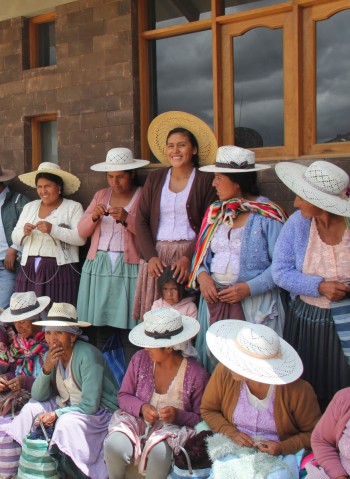
In “Casa San José” of Cochabamba, the Community of Saint Paul Combines Family Reintegration with Schooling for the Children
.jpg)
The goal of la “Casa San José” is the reintegration of children who are living on the streets back into their family homes. There, we have a conflict of priorities, and have recently tried to find a solution.
When the children arrive at the center, a period of intensive work begins. During this time, the psychologist, the social worker and the educators focus on all of the psychological and emotional aspects of the children, as well as their habits, behavior and discipline. This is done through several workshops, with the goal of achieving the child’s reintegration into his family. During this time children do not attend school. That is why we try to keep children at the center only for the time that is absolutely necessary. In fact, the law recognizes the importance of such a period, and the courts do not authorize formal schooling for the children during this time.
The problem begins when the children are ready to return to their families: the family’s suitability has been assessed, the parents have attended parenting classes at the center, but then, due to bureaucratic delays, the legal process takes several months —and during this time the kids cannot return home yet, and they cannot attend school either. And as the saying goes, “Justice delayed is justice denied.”
This situation worries us. Even though our top priority is to restore the family unit, it is a shame not to be able to integrate the children back into school sooner. After thinking much about this and meeting with parents, we found a solution. The families agreed to enroll their children in the schools of their respective neighborhoods, pick up their children at “Casa San José” daily, bring them to school and return them to our center in the afternoon. Even though it represents a major effort on their part, they understood that it was worthwhile to do this, so that the children would not miss a school year. In this way, we’ve been able to bring together family and school, without having to choose one or another.
The Archbishop Emeritus of Cochabamba, with a life of service to the Gospel, receives a well-deserved recognition
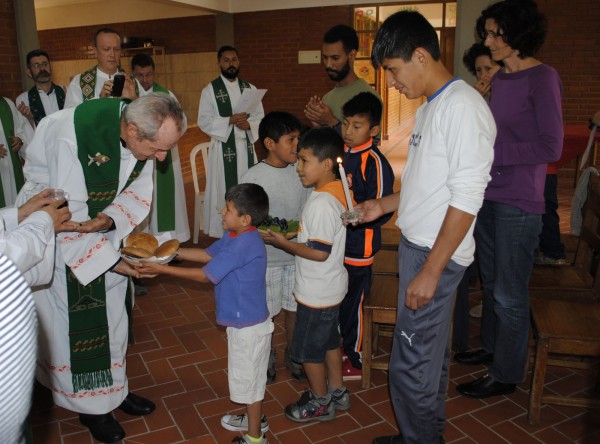
On the occasion of Father's Day, Msgr. Tito Solari, Archbishop Emeritus of Cochabamba, was recognized by the people of the city, who wanted to express their gratitude to him for his work of more than forty years in favor of Bolivia’s most vulnerable men, women and children.
In the celebration to honor Msgr. Solari, the mayor of Cochabamba, Mr. José María Leyes, described the former archbishop as the “spiritual father of Cochabamba”: “Monsignor Tito has been a father, because he has learned to teach his flock. He has also been a father during hard times in the recent history of our city”, he said.
At the commemorative event, the Emeritus Archbishop, a native of Italy, said: “There is something that has been difficult for me to recognize; when it was my turn to leave my parish, I felt like my heart was breaking: there I understood that this was the feeling that a father has for his child”.
Archbishop Solari promoted multiple apostolic and social initiatives during his years as pastor of the Archdiocese of Cochabamba. Among them, the homes for street children and teenagers, such as Casa San José, founded in 2004 by the Community of Saint Paul at the request of the archbishop. Street children have always been one of Msgr. Tito's greatest concerns.
A new initiative to help farming families in Bolivia

As many of the readers of this blog already know, the Community of Saint Paul runs development projects in eight rural communities from the Totora Pampa region, near Cochabamba, in Bolivia. We have implemented a reforestation project, since the zone is very arid and the subsoil is deteriorating slowly with the subsequent loss of nutrients that affects the crops. Each year we have planted fifty thousand trees on the communal lands of the area. A while ago we began a new initiative that, so far, is progressing very well. In one of the controls of the reforested zones we realized that under the pines grew mushrooms: no one collected or paid any attention to them.
Then we decided to take advantage of a resource that was born naturally and without generating any cost. The process through which the local population learned to value the mushrooms was long: we had to demonstrate that this product is not harmful to our health, and that it can be consumed in different ways. Then they had to learn how to preserve the mushrooms in times when the lack of rain no longer allows for their production.
Once the mushrooms began to be an element —although still sporadic— in the local diet, we continued with the following phases of the project. First, people learned how to produce and harvest them properly; next, they learned the mushrooms’ dehydration process.
We delimited the grazing areas, to preserve the areas of mushroom production and thus prevent the llamas, sheep and cows from damaging the crop. We have also regulated the collection to avoid overexploitation and favor the production of the following seasons.
Along the process, theoretical and practical workshops have served us all to learn the physiology of mushrooms and their relationship with the environment. To dehydrate them, we constructed domestic dryers with plastic and local wood near the family houses, so we can protect them from rain and keep the necessary humidity, about 5%, to guarantee the quality of the final product.
As a result of all this work, the people of the Totora Pampa now see the production of mushrooms as an economic and nutritional alternative.
The last aspect of the project has been a surprise even for us: we discussed this initiative with the owners of a few restaurants in Cochabamba… and they were interested! We started a simple marketing of the product, and now four restaurants from the city have become our loyal customers! Currently, the chefs of these restaurants prepare their pizzas of fungi porcini, risottos and different types of pasta, all with our mushrooms! They are the pride of the inhabitants of the humble community of Totora Pampa, who farm the —now increasingly renowned— mushrooms.
A van for 23 students allows young men and women from Totora Pampa (Bolivia) to study without impediments
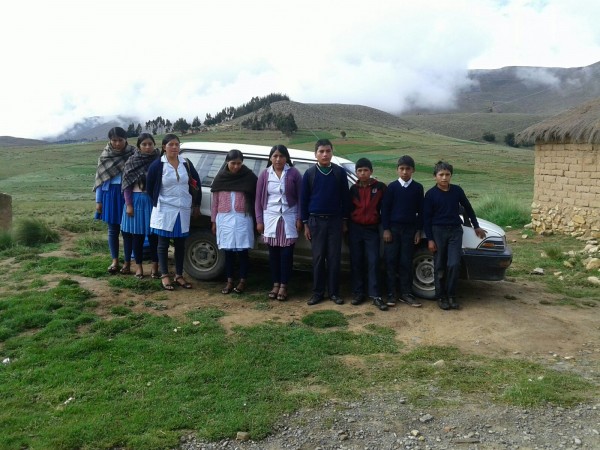
The journey of some students from Totora Pampa —in the high lands of Cochabamba— to their school is now much shorter: until recently, they had to walk two hours from their homes to their classrooms, and now they reach their destination in less than 30 minutes! For these students, the only chance to go to secondary school was by undergoing a tiring and dangerous walk, (especially for the girls), six miles each way, at an altitude of more than 10,000 feet. In such a climate, even a simple cold would make the walk of these youth to their school very hard.
To face this problem, we talked with those living in that rural area about the possibility of hiring a van to cover that journey, and finally the dream came true. A vehicle was hired to help with the transportation of 30 students, each family being responsible for a portion of its service’s cost. Thanks to the van, now the students arrive on time, safely and comfortably to the school. They also can save plenty of time to dedicate it to study and other domestic chores, which are always important in families where each hand counts. The say, happily… “Let’s go to school… but by car, please!”
The Women’s Association of Totora Pampa initiates a program to help illiterate people
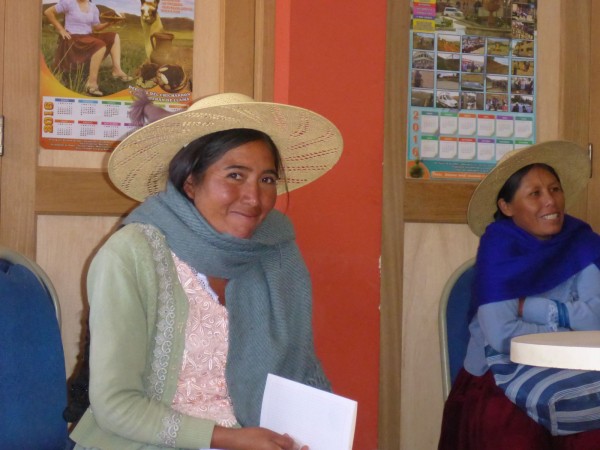
In many rural areas of Bolivia there are adult women who, in spite of the educational improvements of the last decade, remain illiterate. They never had the opportunity to study: there weren’t schools near their towns, or their parents decided that women didn’t need to prepare themselves academically.
A while ago the Association of Women in the area of Totora Pampa informed us of the necessity and desire of many women to study. When they go to the cities to sell potatoes, llamas, sheep, pigs and chickens, they suffer because they don’t know how to read: for those who are illiterate, something as simple as locating an address becomes a problem. Furthermore, in order to obtain identification documents, birth and marriage certificates, school records and bills of sale, it is necessary to be able to read. Otherwise, they can easily be the victims of errors, deceptions or shams.
In response to this problem, José, an agricultural engineer, and Lourdes, an accountant, have started literacy classes for adults. José and Lourdes are a married couple who, in conjunction with the Community of St. Paul, are involved in several agricultural projects and reforestation of the area. Each afternoon they dedicate two hours to teaching literacy to 16 women between the ages of 22 and 72. The gathering finishes by sharing coffee and bread. We hope that there are many more who wish to learn to read and write in order to do business, build their self-esteem and achieve so many goals for which literacy is needed!
To spend years in one place, sharing experiences with its people and accompanying them in their personal processes, has its rewards. Deysi Rosa, for instance, is a great gift for us. We met her when she was barely three years old, and we had just arrived at the Totora Pampa Community in Cochabamba, Bolivia. Deysi, the second of five sisters, was always shy, responsible, hard working and endowed with a great interior strength. However, the family environment where she was growing up didn’t forecast success. Her older sister, at age 20, was already raising two children. Her younger sister didn’t want to study because her plans were, as she put it, “to find a husband while I am still young”.
Deysi, however, had this vague “something” that some people possess, which makes you think that they can really improve their odds, that they won’t accept for themselves a somber future. For years we saw the determination and will that Deysi put into her studies in spite of the fact that the majority of her classmates were abandoning the classroom and starting families.
When we asked her what she wanted in life, she would adopted a firm posture, in spite of her shyness, and would tell us that she would like to achieve more than just work the land and have children. She wanted to study and learn about other places. Her plan, though simple in appearance, was a great challenge: in order to achieve it, she needed to break cultural habits and overcome many economic barriers. The distance between Totora Pampa, in the mountains, and the big city of Cochambamba (where she would study) was not just geographic, but also economic and social.
Seeing her situation, and that of several girls from the same area that had approached our community, we decided to provide scholarships to six young women to study nursing at an institution for women from rural areas. The advantage of this institution is that it provides the students with a place to study, materials, food, schedules and living accommodations. The young people from rural areas can, in this way, overcome the previously mentioned obstacles and barriers and complete their professional formation in the best possible environment.
Today, Deysi is a full time student, and tells us how she takes full advantage of her time, because she knows that this opportunity is a gift. We, however, think that she is the gift. Her interior strength has opened a previously closed door, so that in the future other women from Totora Pampa may follow her footsteps.










.jpg)



